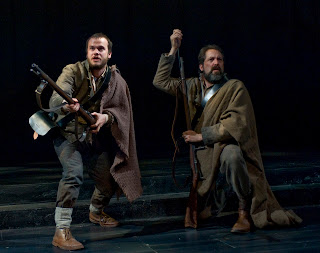(Photo by Michael Brosilow)
The
Civil War was, and still is, the bloodiest war in United States history. The
combined casualties of both the Union and of the Confederacy totaled nearly
620,000 men, a towering number. Fields, forests, and prairie became blood-soaked
mass burial grounds, and the petty conflict ushered in the outdrawn and enormously
costly Reconstruction era, the consequences of which are felt to this very
moment. Must Mitt Romney pick a southern running mate? Deep wounds that have
yet to completely heal over were forged, and a nation's captive moral division
was exposed raw.
And
nearly two hundred years later, with just enough distance from the conflict, yet
still carrying a healthy amount of residual relevance, the events of the Civil
War are ripe for dramatization. Actually southern pageant plays make a yearly
tradition of it, depicting the war gallantly with an exaggerated slant towards
the Confederacy to a cacophony of yee haws, hoots, and hollers. In all likelihood, your uncle is a
Civil War reenactor, gathering with his cronies en masse on the anniversaries
of battles, and is strangely serious about all of it.
So
how, with such plentiful opportunity for entertainment, political discourse,
and historical appeal has Steppenwolf Theatre's The March, which opened on Sunday, gone so terribly awry?
Depicting
General William Tecumseh Sherman’s yearlong campaign
of destruction in Georgia, Steppenwolf Theatre's world premiere adaptation of
E.L. Doctorow's The March, written
and directed by Frank Galati, is a boring,
clumsy squandering of plentiful resources achieving nothing more than some well-designed,
eye-pleasing costumes by Virgil C. Johnson. The play's narrative borders on
incoherency, while purporting to not only be coherent, but also compelling.
Compelling, it is not. Dull and dusty might be better words to describe this March; or rather this outdated, stagnant
trudge.
And
this trudge is undertaken by nearly forty characters, inhabited by a super-sized
cast of twenty-six actors. Amidst the sheer enormity of the war and of the
cast, the play narrowly hones in on four subplots: a freed slave named Pearl
(Shannon Matesky); two escaped convicts and Confederate deserters, Will (Stephen
Louis Grush) and Arly (Ian Barford); the daughter of a Confederate judge who
takes up work in a hospital, Emily (Carrie Coon); and Sherman himself (Harry
Groener).
Their against-the-grain
experiences shed light on the human cost of war – or at least attempt to. Their
stories, when understandable, tend to be lost behind a protective layer of
endless philosophy and romanticized language, part Doctorow and part Galati,
that paints an awfully pretty picture of the deadliest war in our nation’s
history.
The
production also feels awkwardly unfinished, most notably among the actors. The
ensemble monotonously breezes through their sticky dialogue without any
perceivable commitment, and the lead actors get trapped in Old South
pastoralism right from the offset.
Ian
Barford and Stephen Louis Grush, who I scornfully began referring to as Tom and
Huck, play Will and Arly, two too lovable escaped convicts and Confederate
deserters disguised as soldiers. Their storyline is endearing, but altogether not
very intriguing. Barford finds the funny and lathers on mint julep charm for
the greater part of the play, but falls quite short in moments of seriousness.
Despite its shortcomings, Will and Arly are the most watchable characters
onstage.
Harry
Groener, seen last season in The Madness
of George III at Chicago Shakespeare Theatre, plays General Sherman with
the quirky gravitas of the Wizard of Oz.
His offbeat mannerisms lead me to believe that his portrayal aimed to satirize
the long-dead general, but then he would rattle off a few serious historical
epilogues that muddied my perception. Sherman is just kind of –
there. Shannon Matesky's Pearl, a
biracial slave who, at the play's opening, achieves her freedom, never moves an
inch beyond awestruck. Her perpetual naivety does not serve a three-hour story
of supposed growth.
Much
displeasure over lack of invigorating content could be quickly forgiven by a
dose of spectacle. And given Galati's relatively recent credits like Ragtime and The Pirate Queen, a cast that could double as a militia, and a
thematically mammoth time period, visual excitement seems inherent. However,
the play is aesthetically bland, appearing mostly whitish gray and dead shades of
blue. James Schuette’s efficiently designed set, evokes
the right amount of period, but blends the individual textures of location into
mush.
Adaptor-Director
Frank Galati is no virgin when it comes to E.L. Doctorow. He memorably directed
the musical adaptation of Doctorow's Ragtime
on Broadway in 1998, and has been interested in adapting The March for years. But his adaptation is not stage-ready and his staging
is a mixed bag as well.
Calamitous
scenes are rendered sterile, and noticeable inconsistencies in a few slow
motion sequences appear amateurish. Accompanied by Josh Schmidt’s
sound design of loud disjointed sound bites, the incomprehensible violence of
the Civil War is muted. The grandest cautionary tale in American history is,
here, a pleasant afterthought.-Johnny Oleksinski

